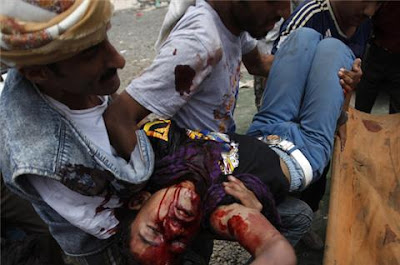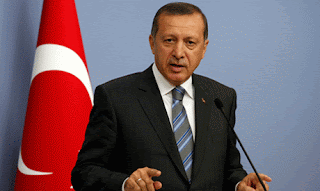It looks as if the ruling military council in Egypt (SCAF) is running out of wisdom.
AhramOnline reports that the SCAF and the government-Sharaf met on Wednesday to discuss what a cabinet spokesperson described as a “deteriorating security situation' and took some very restrcitive measures. .
The meeting came at the end of a tumultuous week. Thousands of workers have begun a series of economic strikes, others are planning to join the strike wave at the beginning of next week. Revolutionary youth groups like the 6 of April Movement continue to mobilize for a massive rally to take place in Tahrir square today, Friday, to challenge the continuing processes of civilians by military courts and çorrct teh path of the revolution'. Annd then there was the clash, last Tuesday, of fans of the country’s largest football team, Ahly, with the police that left 133 people wounded.
As a consequnece, the SCAF issued six directives for Sharaf to follow immediately.
1. The cabinet will use all legal means to prosecute what the council described as all and any acts of thuggery. 2. The cabinet will support all police efforts to maintain peace. 3. The cabinet will intervene to halt all strike actions, and it will enforce a law it passed last spring, which criminalizes certain strikes that disrupt public life. 4. Sharaf will not negotiate with strikers over any demands until workers halt their workplace actions. 5. Sharaf will suspend issuing new licenses to Satellite television stations. 6. The cabinet will start legal procedures to review licenses it issued to any Satellite television network that incites violence and protests.
The minister of information, Osama Haikal, said at the end of the joint meeting that the military council remains committed to freedom of expression and media. But unfortunately the measures against strikes and tv-channels tells otherwise.
Postal workers on strike. They carry a banner witn the name of their union: The Independent Union of the Workers of the Egyptian Post.
The SCAF and the government alike don't seem to know very well how to deal with the growing discontent, like the anger over the military processes, the general dissatisfatcion about the course of the revolution, the increasing number of strikes, an the growing criticism by different media like the new tv-channel Tahrir for istance. Of these particularly the strikes should bother them. Since the end of the month of Ramadan a new wave of labour strikes and protests in the public sector have spread across Egypt. In dispute after dispute, workers focus on two main issues: raising wages, and purging different government-owned factories and institutions of corrupt officials from the Mubarak era.
The recent action seems to reflect a sense that many workers in the public sector have run out of patience with Sharaf’s government, which made a number of promises when it first took office last March, but has not adequately delivered. For example, Sharaf’s cabinet refused to honour a three-year-old court order that mandated that the government raise the national minimum wage for workers to LE1,200 per month. Instead, Sharaf told workers that his government could only commit to raise wages for everyone to LE700, and promised to do so by July, but failed to deliver even on this much lower figure. Moreover, Sharaf’s cabinet has also failed so far to put a cap on the excessive salaries it pays to top officials in the public sector, a widely popular demand among public sector workers. To add insult to injury, many workers think that Sharaf has, for the most part, treated Mubarak-era officials with kid gloves, and dismissed only a handful from high positions.
In fact, most Egyptian workers across the country come to work every morning, seven months after they played a key role in toppling the former dictator, to be greeted by the same old bureaucrats and authoritarian figures from the Mubarak years. A case in poit are the workers at the Egyptian Postal Services Authority. Thousands of low-paid postal workers are now on strike for the second week. They demand that Sharaf purge the publicly owned Postal Services of dozens of corrupt managers and over-paid consultants. Also they want a 7 per cent annual pay increase to keep up with inflation and a 200 per cent bonus for meeting annual production goals.
The recently-formed independent unions of postal employees called for the strike.Hisham Abdel-Latif, the president of the Cairo branch of the independent union, told
Ahram Online that postal workers feel bitter due to the astronomical differences between their meagre salaries and out-of-control compensation packages that top officials in the services receive. For example, Abdel-Latif said that the salary of an employee after 15 years does not exceed LE 1500, whereas the director of the Postal Services pays 26 of his top consultants an average of LE25,000 per month. These consultants are mostly retired police and army generals who are friends of the director and do not contribute anything, but simply drain the resources. Three of the Postal Authority’s director's four top deputies get even the sum of LE168,000 per month. Abdel-Latif said, whereas the slaray of the Authority’s director himself remains a total secret.
Last winter, in the weeks immediately after the ousting of former president Mubarak, postal workers organised several strikes and protests in order to pressure the ruling military council into dismissing top officials in the Postal Authority who were part of Mubarak’s entourage, as well as dismissing some external consultants. In response, the SCAF sent army soldiers to break a number of strikes, but also promised that it would take note of workers’ demands. However, as months went by, Sharaf’s government dragged its feet on the issue of meeting postal workers’ wage demands.
For years now, according to Abdel-Latif, postal workers have felt that they have created a massively successful operation that brings in billions to the government, without seeing any of the fruits of their labour.In fact, the Egyptian government generates a considerable amount of cash from its Postal Authority.he Authority not only uses post offices to deliver regular mail services to the public; it also runs savings accounts for millions of citizens and handles the distribution of pension cheques to millions of retirees.
“The Postal Authority is not only a solvent entity, it is actually quite profitable. Their savings accounts operation brings in LE62 billion annually, which the authority invests in banks,” Abdel-Latif told Ahram Online. “They can easily afford to improve the living standards of their hard working employees.”
Other workers are theatening to follow the same course as the postal workers. Among the 22,000 workers at the country’s largest textile factory in Mahalla, in the Nile Delta, the Egypt Weaving and Textile Company. Doctors, teachers and university professors are also preparing actions. The employees of Cairo Airport ar already striking, and the list is far from complete.


.jpg)


























